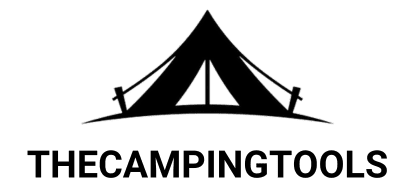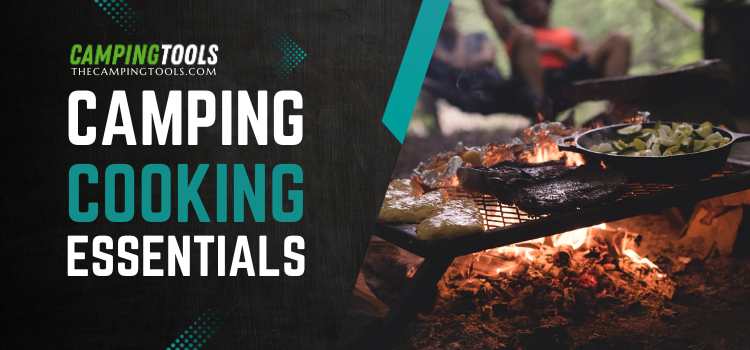Are you planning a camping trip? Are you worried about what camp cooking gear you should take? Look no further! In this guide, we will cover all the camping cooking essentials and tips for outdoor cooking.
Benefits of Outdoor Cooking
There’s nothing quite like cooking in nature. It’s a great way to bond with your friends and family while enjoying the beautiful outdoors. Not to mention, food always seems to taste better when cooked on a campfire or camping stove.
What to Consider When Camping and Cooking

Before you start packing for your trip, there are a few things you should consider. First, check if there are any fire restrictions in the area you will be camping in. If so, you may need to bring a portable stove instead of relying on an open fire. Also, think about the type of meals you want to prepare and the cooking methods you will need.
Camping Cooking Essentials for Outdoor
When it comes to camp cooking gear, there are a few essential items that should always be on your packing list.
These include:
Tent and Stove – Must Have Camping Gears
A good quality tent is essential for any camping trip, especially if you plan on cooking. It will protect your food from the elements and provide a sheltered space for cooking during bad weather. A portable stove is also a must-have as it allows you to cook safely without relying on an open fire.
Spices, Sauce, and Other Condiments
Don’t forget to pack your favorite spices, sauces, and condiments. These can add flavor to your meals and make them more enjoyable. Just be sure to pack them in secure containers to avoid any unwanted spills.
Utensils and Pans
Camping utensils and pans are specifically designed for outdoor cooking. They are lightweight, durable, and easy to clean. Be sure to pack a set of utensils that include a spatula, tongs, and a can opener. Also, bring pots and pans that are suitable for campfire cooking.
Transportation of Food and Supplies
Planning is key when it comes to food storage during camping trips. Make sure you have enough coolers or storage containers to keep your food fresh and organized. It’s also important to pack non-perishable items such as canned goods, dried fruits, and trail mix for longer trips.
Keeping Foods Cold During Travel
When packing coolers, be sure to use ice packs or frozen water bottles instead of loose ice. This will prevent your food from getting soggy and keep it at a safe temperature for consumption. It’s also a good idea to pack perishable items in separate coolers to avoid cross-contamination.
Choosing the Right Meal Options for Camping
When it comes to meal options, there are a few different routes you can take. You can either bring pre-made meals or meal kits that require minimal cooking, or you can cook from scratch using fresh ingredients. Another option is to bring freeze-dried meals that only require hot water for cooking.
Pre-made Meal or Meal Kits
Pre-made meals and meal kits are a convenient option for campers who don’t want to spend a lot of time cooking. They are easy to prepare and come in a variety of flavors and options. Just be sure to check the expiration dates before packing them for your trip.
Cook from Scratch or Freeze-dried Meals
For those who enjoy cooking, bringing fresh ingredients and cooking from scratch can be a rewarding experience. It allows you to experiment with different flavors and dishes while enjoying the great outdoors. However, if time is limited or space is an issue, freeze-dried meals are a quick and easy option that still provides a hot and satisfying meal.
Tips on Safety and Sanitation in the Wild
When cooking outdoors, it’s important to follow proper safety and sanitation practices. Here are a few tips to keep in mind:
- Always wash your hands before handling food.
- Keep raw meat separate from other foods to avoid cross-contamination.
- Use a meat thermometer to ensure that meats are cooked to a safe temperature.
- Dispose of all food waste properly and keep your cooking area clean.
Clean Up After Your Meal and Put Out Fires Properly
Proper cleaning up after meals is not only important for keeping the campsite clean but also for avoiding attracting unwanted animals. Make sure to dispose of all food scraps in designated trash bins or pack them out with you if no bins are available.
Additionally, when putting out a fire, make sure to completely extinguish it and properly dispose of any remaining hot coals.
Different Ways to Bake, Boil, Roast, Fry, Etc While Camping
There are many ways to cook while camping besides just using a traditional camp stove. Consider investing in a portable grill or Dutch oven for baking, roasting, and grilling. You can also use a foil packet to cook over an open fire or even bring along a portable deep fryer for frying up some tasty treats.
Recommended Recipes That Can Be Prepared at Campsites
Here are three easy and delicious recipes that can be prepared at your campsite:
- Foil Packet Sausage and Veggie Dinner:
- Cut up some sausage, potatoes, and veggies of your choice.
- Place them in a foil packet with seasonings and olive oil.
- Cook over the campfire for about 15-20 minutes, or until everything is cooked through.
- Campfire Breakfast Burritos:
- Scramble some eggs and cook up some bacon or sausage in a pan over the campfire.
- Warm up some tortillas on the camp stove.
- Assemble burritos with eggs, meat, and any other desired toppings.
- Roll them up and wrap them in foil to keep them warm until ready to eat.
- Dutch Oven Peach Cobbler:
- Spread canned peaches in a buttered Dutch oven.
- Top with biscuit mix, brown sugar, and cinnamon mixture.
- Place coals on top and around the Dutch oven and cook for about 30 minutes or until golden brown.
Common Challenges Faced by Beginner Campers During Mealtimes
As a beginner camper, it can be overwhelming to plan and prepare meals while also dealing with the challenges of being in nature. Some common challenges include:
- Limited storage space for food and cooking equipment
- Difficulty keeping perishable foods cold without a proper cooler or ice packs
- Inexperience with outdoor cooking techniques and tools
- Dealing with unpredictable weather conditions while trying to cook outdoors
Conclusion
Camping cooking essentials are necessary for a successful and enjoyable camping trip. By understanding the benefits of outdoor cooking, considering camping cooking equipment and transportation of food and supplies, choosing the right meal options, and practicing safety and sanitation techniques, you can have a delicious and stress-free meal while exploring the great outdoors.
Don’t forget to clean up after your meals and properly put out any campfires for a responsible camping experience. With these tips in mind, you can create memorable meals and truly embrace the camping experience.
Happy Cooking!






